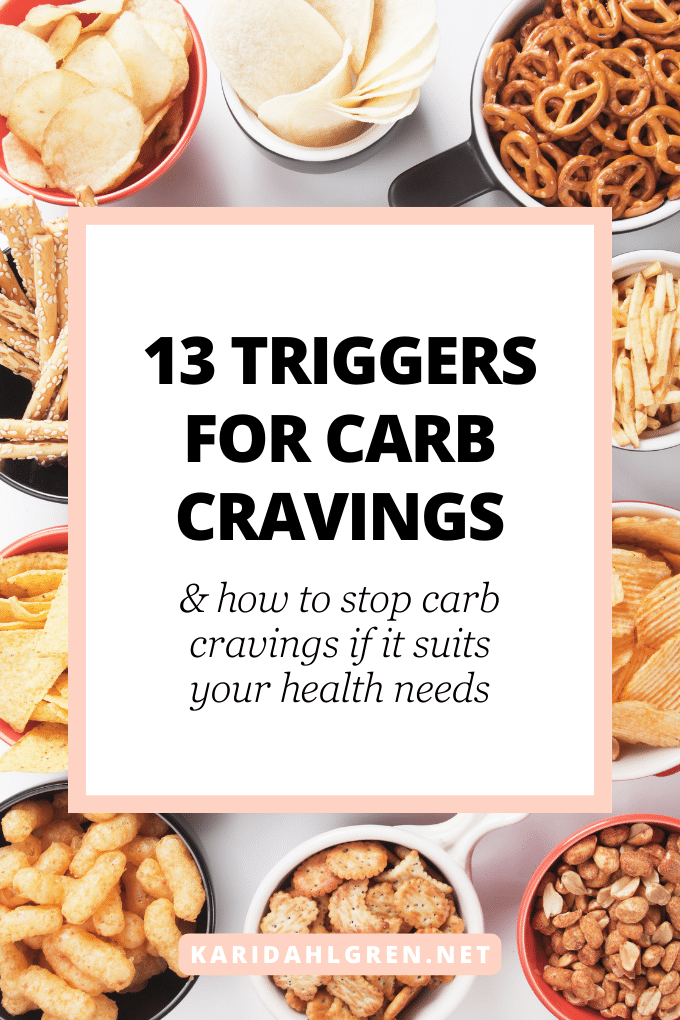
Carbohydrates are one of the three macronutrients – carbs, fats, proteins – that are essential for a healthy and balanced diet. Limiting carbs is common advice for weight loss or certain health conditions. However, many people struggle with unwanted carb cravings and find themselves frustrated by the thought, “Why am I craving carbs so much?”
From what I have seen as an eating psychology coach, most people that struggle with craving carbs are restricting carbs. Not only that, but they might even be afraid of carbs because of the latest stigma that carbs lead to weight gain—even though there’s evidence for and against low-carb diets and weight loss.[1]
In this post, you’ll discover evidence-based reasons for craving carbs so that you can navigate your relationship with food with more confidence. If you want to learn how to stop craving carbs, it’s important to identify whether or not you’re consuming carbs in excess, and if restricting them is appropriate for your needs.
Why Am I Craving Carbs? Answers Backed by Science
Gaining insight into the biological, psychological, and environmental triggers for carb cravings can empower you to recognize your own patterns and develop a more targeted approach to managing cravings.
Understanding the science can help demystify carb cravings, making them less about willpower and more about physiology and eating psychology. This shift in perspective can help reduce guilt and foster a more compassionate, understanding approach to one’s own body and needs.
Here are some evidence-based reasons for craving carbs:
- Blood Sugar Fluctuations: When blood sugar levels drop suddenly, the body seeks a quick source of energy, often leading to cravings for sugary or starchy carbs. This is especially common after a meal consisting of refined carbohydrates and limited protein, which causes blood sugar to spike and fall, prompting cravings for more carbs to bring blood sugar back into balance.[2]
- Physical Hunger: Carbohydrates offer a quick energy source for the body, where excess energy is stored in the liver and muscles (as glycogen) for later use.[3] If you’re hungry and craving carbs, this could be a straightforward reason why.
- Restrained Eating: Restricting carbohydrates can sometimes lead to increased cravings for carbs, a phenomenon supported by some clinical evidence.[4], [5] However, not all studies have found this effect.[6], [7] If you want to learn how to stop craving carbs, it’s worth considering how restriction might influence your cravings.
- High-Intensity Exercise: The next time you ask yourself, “Why am I craving carbs?” take a look at how often you exert yourself physically. If you participate in high-intensity exercise or otherwise strenuous work, your body may crave carbs once glycogen is depleted.[8]
- The Serotonin Effect: Carbohydrates have the ability to increase serotonin levels in the brain, which can enhance mood and create a sense of calm. When serotonin levels are low, you may crave carbs to restore this feeling of well-being.[9], [10], [11] [12]
- The Dopamine Effect: Carbohydrates also have a unique ability to trigger the release of dopamine, a neurotransmitter often associated with feelings of pleasure and reward.[13] This hedonic aspect of carbs can lead to ‘eating for pleasure,’ where the brain’s reward circuitry is activated, creating a cycle of gratification and more cravings.
- Emotional Eating: When it comes to eating without physical hunger, negative emotions are a common trigger.[14] Because of the calming effect of carbohydrates, a craving for them can become a maladaptive coping mechanism during distressing times.[9], [10]
- Micronutrient Deficiencies: Micronutrients are essential vitamins and minerals. Some unsupported sources claim that a deficiency in the micronutrients chromium and magnesium can cause carb cravings, yet clinical evidence is lacking. Chromium and magnesium help regulate insulin, which then regulates the effect that carbs have on blood sugar.[15], [16] However, no evidence directly links a deficiency in either micronutrient with an increased craving for carbs.
- Macronutrient Deficiencies: There is clear evidence, however, that an overall deficiency in carbohydrates (such as a low-carb diet) can trigger cravings for carb-rich foods.[4], [5] Some studies attribute this to the body’s need for glycogen, because when glycogen is lacking, the body may increase cravings for carbs in an attempt to replenish its energy stores.[17], [18]
- Stress: If you find yourself wondering, “Why am I craving carbs?” it’s a good idea to assess your stress levels. During stressful times, the body’s cortisol levels rise, which can increase appetite and cravings for hyperpalatable foods, or foods high in fat, salt, sugar, or carbs.[19], [20]
- Gut Microbiome: The balance of bacteria in the gut can influence food preferences and cravings. One study found that supplementing with prebiotics, which promote the growth of beneficial gut bacteria, helped reduce carbohydrate intake.[21] Although this does not establish a direct causal relationship, there is evidence suggesting a connection between enhanced gut health and diminished cravings for carbs.
- Hormonal Fluctuations: Women may experience carb cravings due to hormonal changes during their menstrual cycle, particularly during the premenstrual period.[22] Other causes of hormone fluctuations such as pregnancy or menopause may also contribute to cravings.
- Lack of Sleep: The next time you catch yourself asking, “Why am I craving carbs?” check your sleep patterns. There is strong clinical evidence linking insufficient sleep with increased consumption of carbohydrates and sweets.[19], [23], [24], [25]
As you can see, there’s an abundance of reasons for craving carbs. Work with your doctor to make sure that your cravings aren’t a symptom of underlying medical conditions, and consider working with a dietitian to ensure that you’re meeting all your micro- and macronutrient needs.
Before we dig into the steps for learning how to stop craving carbs, let’s briefly recap everything we’ve explored so far.
Long Story Short: What Does It Mean When You Crave Carbs?
If you’re craving carbs, it could be due to blood sugar fluctuations, especially after eating refined carbs. Restricting carbs might increase cravings, while high-intensity exercise can deplete glycogen stores, making you crave carbs for energy. Mood also plays a role as carbs can boost serotonin and dopamine levels, making you feel better. Stress, lack of sleep, and hormonal fluctuations can also increase carb cravings.
Up next, you’ll learn how to stop craving carbs—if cravings go beyond balanced levels—using evidence-based strategies.
How to Stop Craving Carbs: 8 Tips
Armed with an understanding of potential triggers for carb cravings, you’re now poised to take actionable steps to manage and reduce these cravings, if cravings exceed balanced levels. By continuing to dive into clinical evidence, you can go beyond mere trial-and-error and move forward with confidence.
Here are some steps you can take to learn how to stop craving carbs if it suits your personal health journey:
1. Eat Balanced Meals: Carbs, Fats, Proteins
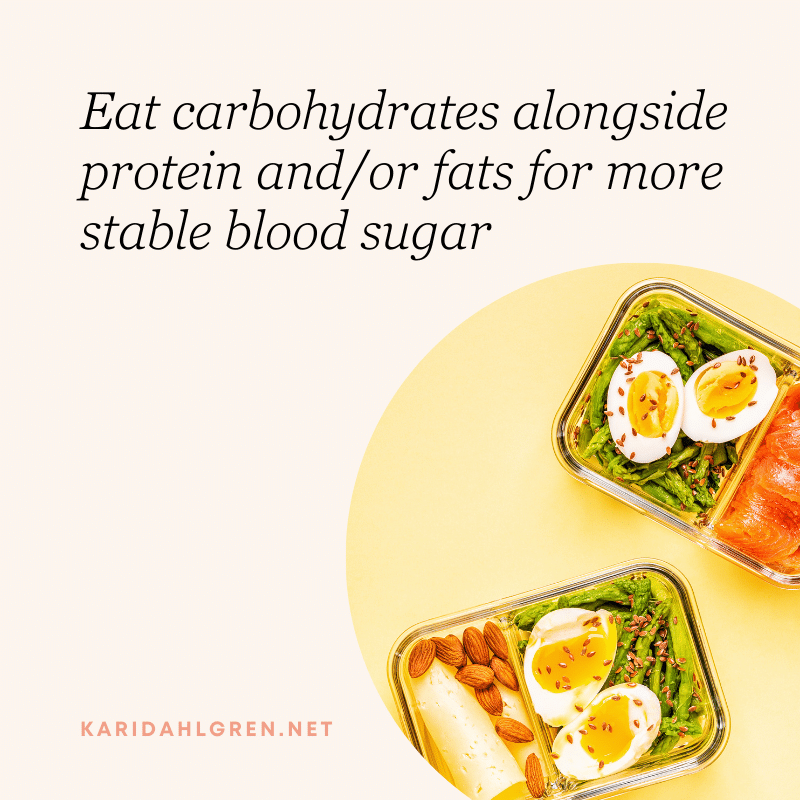
When you eat refined carbs on their own, such as instant ramen, they can cause your blood sugar levels to spike and then crash, which can leave you craving even more carbs to get blood sugar levels back up. To help prevent these peaks and valleys, it’s a good idea to pair carbs with protein. This combination can help slow down the absorption of sugar into your bloodstream.[2]
Eating enough carbs is also important because it helps replenish your body’s glycogen stores. When these stores are low, you might find yourself wondering “Why am I craving carbs so much?” more often. By including a sufficient amount of carbs in your meals, you can help reduce cravings related to glycogen depletion.
2. Pay Attention to Your Unique Response to Carb Restriction
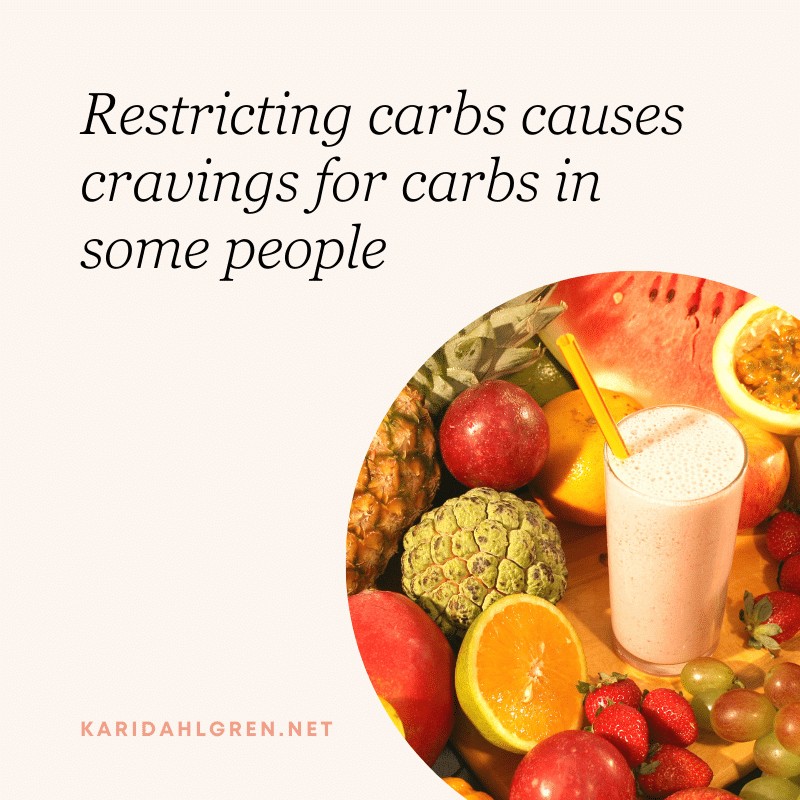
If you want to learn how to stop craving carbs, the next place to look is restriction: are you restraining carbs to begin with? Sometimes, trying to cut carbs out of your diet entirely can backfire, making you think about them even more. Research has shown that when people try to avoid certain foods, they end up craving them more and thinking about them more often.[26], [27], [28]
When you try to ignore your craving and eat something else instead, you might end up eating more overall, including the carbs you were trying to avoid in the first place. This is known as “eating around” the craving. For many people, especially when there’s no medical reason to avoid carbs, it’s more effective to focus on a balanced diet rather than cutting out carbs completely.
3. Check Low-Carb Diet Companies for Bias
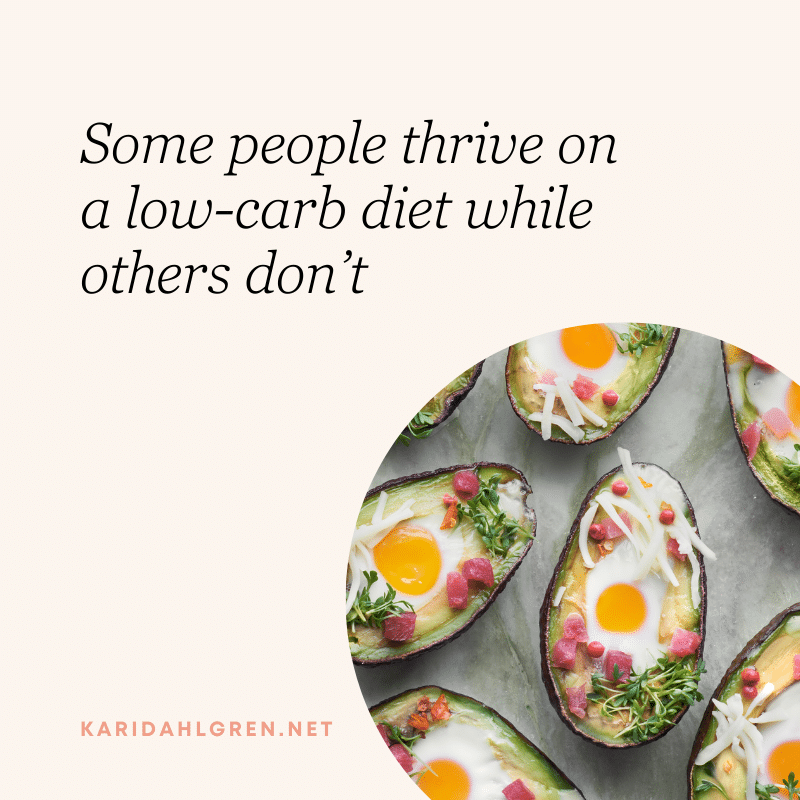
Diet companies that promote low-carb intake, like Atkins, selectively choose to highlight clinical studies that show a link between low-carb diets and reduced cravings for carbs.[29] However, it’s important to view all sides of clinical literature, as the results are mixed and some evidence shows that a low-carb diet heightens cravings for carbs.[4], [5], [26], [27], [28]
Every person is unique, which means that low-carb diets affect everyone differently. The answer to the frequently asked question, “Why am I craving carbs so much?” is different for everyone. Some people may thrive on a low-carb diet while others struggle with heightened cravings for carbs when they are restricted.
Battling against cravings can diminish self-esteem, heighten self-criticism, and sometimes lead to disordered eating.[30] Because of this, it’s important to challenge diets that claim one-size-fits-all and listen to what your body is telling you.
4. Try Intuitive Eating
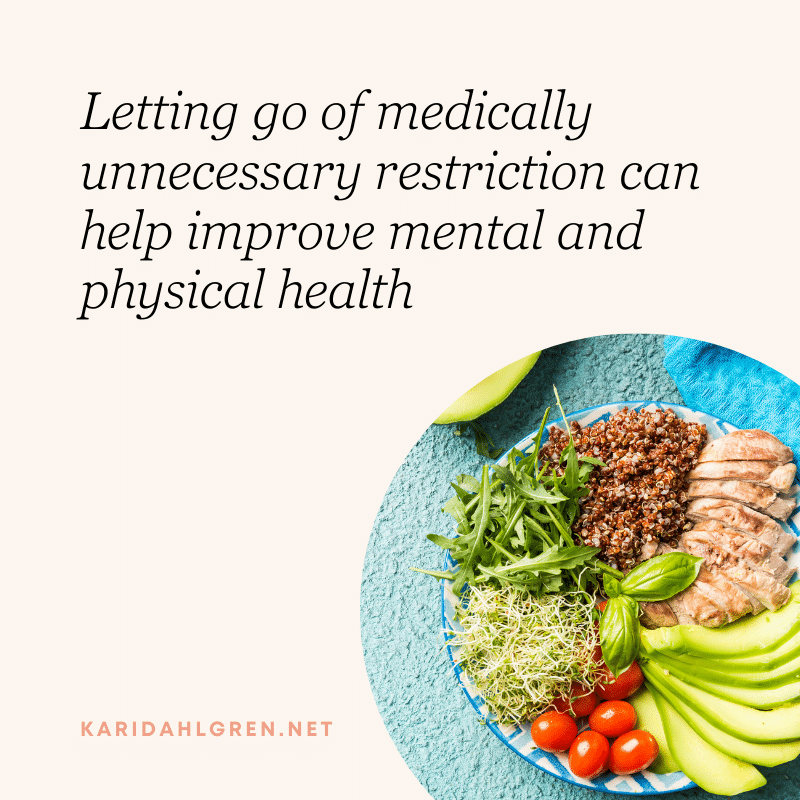
Instead of following rigid diets that eliminate entire macronutrients, try to listen to your body and eat intuitively instead. Some people may find that, when they give up dieting and truly listen to what their bodies are telling them, they may naturally eat less carbs. Some people may eat more carbs.
The overarching benefit of intuitive eating is that, compared to dieters, it results in better metabolic fitness, improved body satisfaction, enhanced self-esteem, and improved psychological health—among other benefits.[31] By giving yourself permission to enjoy a variety of foods without guilt, you may find that you naturally learn how to stop craving carbs because balance emerges on its own.
5. Embrace Food Neutrality
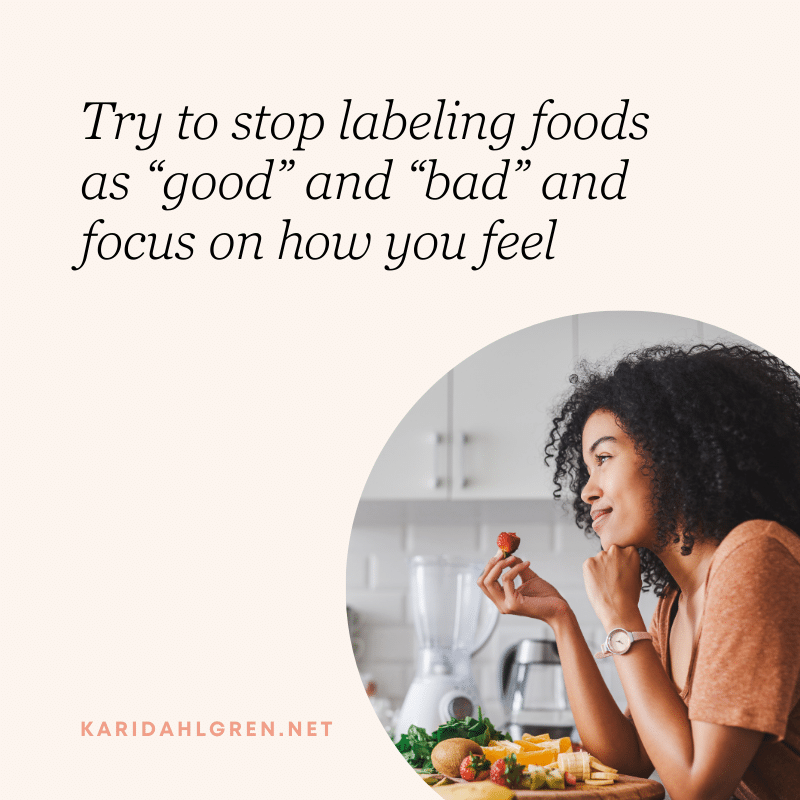
In today’s culture that revolves around dieting, there is often a sense of moral superiority for eating “good” foods and moral inferiority for eating “bad” foods.[32] This can heighten guilt and shame for eating foods deemed by popular culture as unhealthy even if it’s what’s right for you. If you feel guilty or ashamed when you ask yourself, “Why am I craving carbs so much?” this could be why.
Food neutrality is the concept of viewing all foods as equal, without labeling them as “good” or “bad.” This mindset can help reduce the guilt and shame often associated with eating certain foods, like carbs, which in turn can lessen the intensity of cravings. When you stop resisting carbs and allow yourself to enjoy them in moderation, they can lose their allure.
6. Add Joy to Your Life Outside of Food
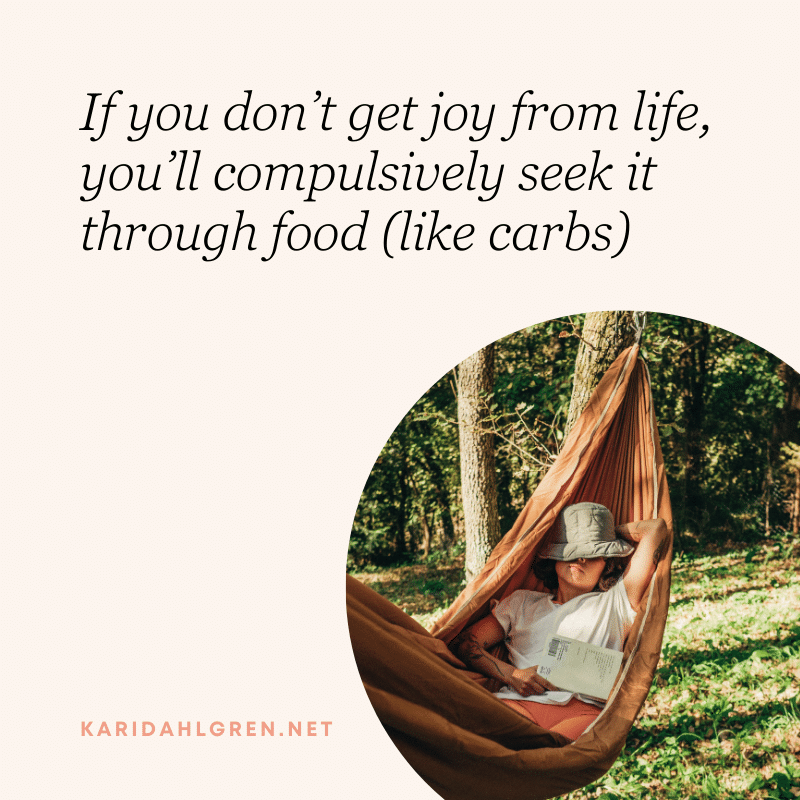
Focusing on fun and joy can help you learn how to stop craving carbs in excess. When fun and happiness are missing from your daily experiences, it’s natural to seek pleasure in “fun foods” like carbs, which can provide a temporary boost in feel-good chemicals like dopamine and serotonin. By finding alternative sources of joy and fulfillment, you can reduce your reliance on food for emotional satisfaction.
Engaging in hobbies, spending time with loved ones, practicing self-care, or pursuing personal interests can all provide a sense of pleasure and contentment. In turn, this can help you learn how to stop craving carbs because you no longer need them as a source of pleasure. Some people advocate for better self-care to help address emotional eating too, but keep in mind that self-care is distinctly different from developing emotional skillsets.
7. Address Emotional Eating
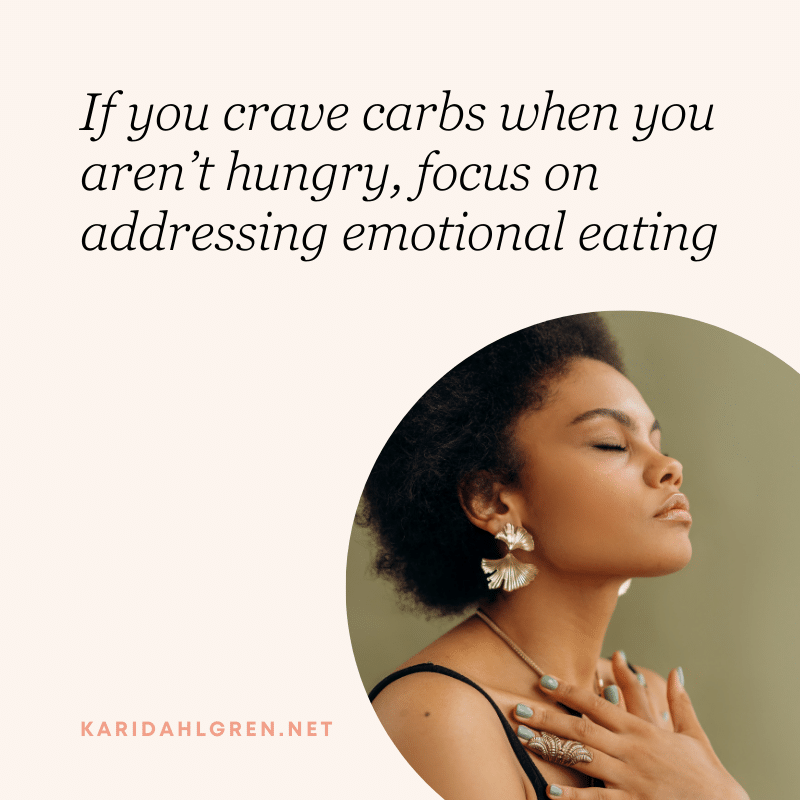
When you find yourself asking, “Why am I craving carbs?” and you aren’t physically hungry, this relates to overeating, and it’s important to turn within and address any underlying emotions. Studies show that negative and positive emotions can trigger overeating and binge eating.[33] By learning how to manage your emotions, you can also learn how to stop craving carbs when you’re not hungry.
My Stop, Drop, & Feel method offers a structured way to navigate the desire to eat without hunger, addressing the root cause of emotion-triggered carb cravings. Here’s how it works:
- Stop: When you feel a compulsion to eat carbs without hunger, take a moment to pause. Promise that you can eat the carbs if that’s still what you really want after the SDF is over (this honors the element of permission).
- Drop: If possible, move to a quieter space and set a timer for a few minutes. Then, get curious about what you’re feeling. Are you stressed? Lonely? Bored?
- Feel: Allow yourself to fully experience your emotions, even if they’re uncomfortable. This is about building emotional resilience and learning how to sit still with discomfort instead of getting swept away by it—a skill I call emotional tolerance.
The essence of the Stop, Drop, & Feel method lies in its non-restrictive nature. It’s designed to foster emotional awareness and address the root causes of emotional hunger, rather than simply white-knuckling your cravings. More importantly, this method can help you break free from the dieting mindset as you learn to focus on and manage the emotions behind carb cravings that go beyond physical hunger.
8. Prioritize Relaxation
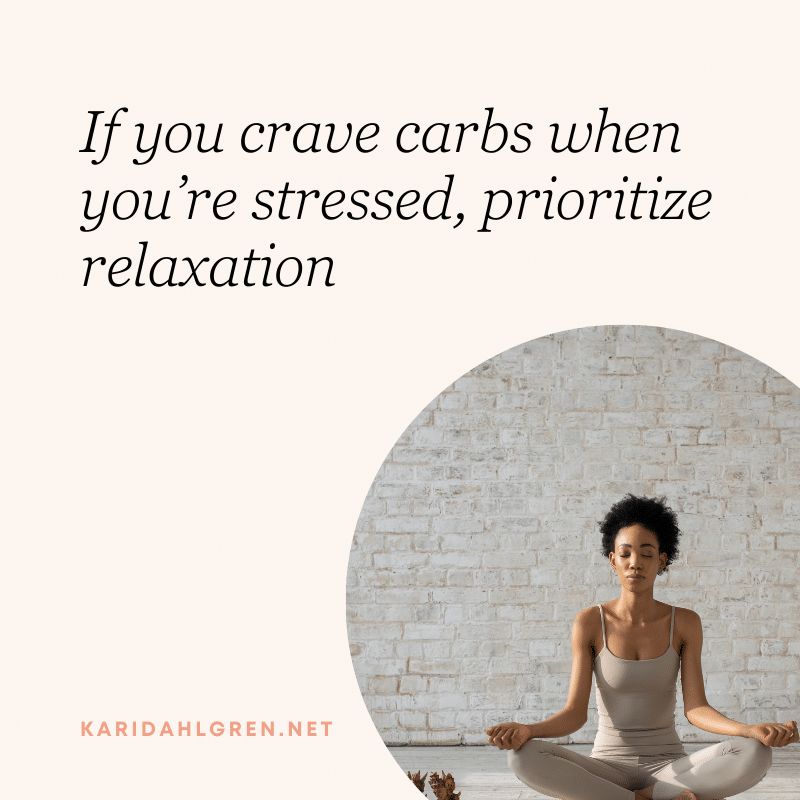
Prioritizing relaxation is key to reducing carb cravings, particularly those triggered by stress or lack of sleep. Integrating relaxation techniques into your routine can mitigate stress and enhance sleep, hopefully accelerating your journey as you learn how to stop craving carbs in excess.
For example, progressive muscle relaxation has been shown to significantly reduce night eating tendencies after just 8 days of practice.[34] Adopting relaxation practices—be it progressive muscle relaxation, deep breathing, or meditation—can help you manage stress-driven carb cravings by addressing their root causes, ultimately improving your overall health and well-being.
Finding Balance with Carbohydrates
Answering the question, “Why am I craving carbs?” is a multifaceted journey that goes beyond simple dietary adjustments. It’s about delving into the underlying reasons for your cravings, whether they stem from blood sugar fluctuations, emotional eating, or lifestyle factors like stress and sleep.
By adopting evidence-based strategies such as eating balanced meals, embracing food neutrality, and prioritizing relaxation, you can find a sustainable way to satisfy your body’s needs without feeling deprived or frustrated by excessive carb cravings. Remember, it’s not about perfection but about finding a balance that works for you.


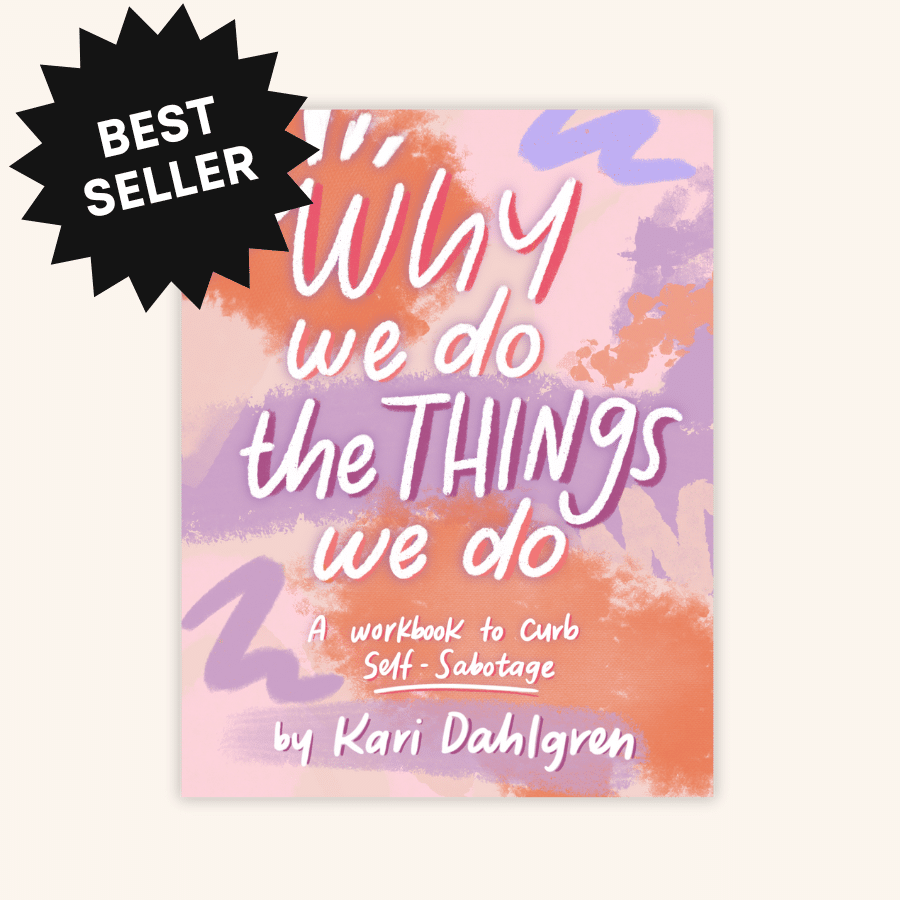
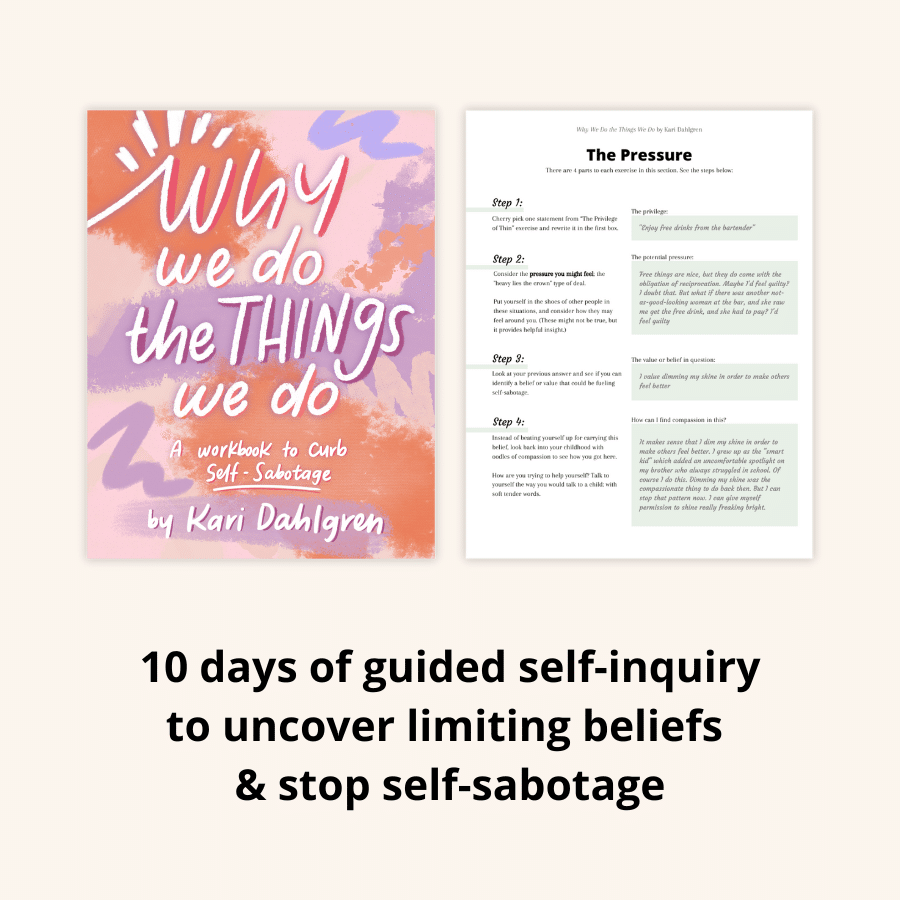
Thank you for the info but I am not an emotional eater. I do have tendencies at times to crave carbs and I also love my wine. Those are my weaknesses and will try to control them better with moderation and self discipline.
Thank you
Thanks for the comment Janet! I appreciate you sharing your experience.
I relate very much to the restrict/binge cycle and to now not craving certain foods since they are all the same. I honestly thought I had a full-on eating disorder until I came across your videos. I am so grateful that the noise in my head about food is nearly gone! Food Normal has shone a spotlight on the crazies around food brought to us by the diet culture (thanks for nothing!) and I am experiencing more and more moments of sanity in my eating. I know what physical hunger is and, when I have a food thought outside of that, I know to SDF! Yay!! Thanks so much. 🙏🙏🙏
Hi Dolores! Wow, what an amazing success story!! I am so glad that you’ve moved closer and closer to feeling normal around food. That is the dream and the goal! Thanks for the comment 🙂